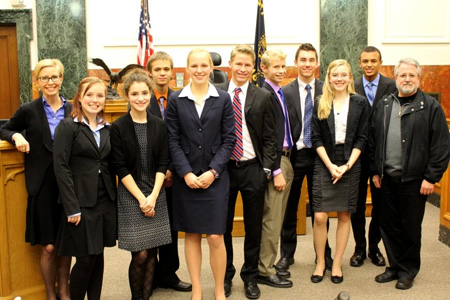
Poetry Out Loud
St. Stephen’s Academy students have the opportunity to participate in Poetry Out Loud, a national poetry recitation competition for grades 7-12. We participate in this competition because of the way it asks students to engage language. Ultimately, the competition is not simply about memorization, but communication of meaning. Poetry is language at its most heightened form, and an intimate engagement with poetry invites students to engage language at the highest level. The actual presentation gives students the public speaking experience that we are seeking to develop as a part of our rhetoric program. We have had multiple students move on past the regional competition to compete at the state level.
Robotics
St. Stephen’s Academy Middle School students have the opportunity to join a Varsity and a Junior robotics team and participate in a FIRST LEGO League tournament. The program is designed to give the students a sense of what it means to be an engineer. They work on developing important life skills, such as listening to one another, being able to present and explain an idea, and make decisions as a group. The students learn basic mechanical engineering concepts using LEGO Mindstorms parts and Software Engineering using EV3 robots. The result of their work is a fully autonomous robot able to solve missions on the competition field. In addition, each team has an opportunity to research an innovation project and connect with businesses and experts in the field. The St. Stephen’s teams have been competing with great success at the local and state level since 2013.
String Ensemble
The St. Stephen’s Academy string ensemble began in 2006. Students who join the string ensemble have learned to play their instrument through independent instruction and practice. They come together in the SSA string ensemble to learn pieces to perform at school functions. This program is a natural fit with our school’s emphasis on music and the arts, and our ethic of learning from the great artistic achievements of the past.
 Mock Trial
Mock Trial
Mock trial is the high school student’s opportunity to take the classroom exercises of the dialectic and rhetoric years and use them in a public setting which requires decorum, quick thinking, and confident delivery. Using the skills of critical reading, logic, research, constitutional and legal knowledge, writing, and oratory, students push themselves in mind, body, and soul to prepare for two courtroom trial competitions. In each competition, their team has several opportunities to play both plaintiff/prosecution and defense. They always argue both sides of each mock trial case.
For two months before each competition, team members teach one another new concepts, write their own speeches, and meet often as lawyer-witness pairs to push toward more careful reasoning and the probing arc of questions which will bring that reasoning to light in the courtroom. Held accountable by their coaches and fellow team members, they also train to minimize their human weaknesses: laziness, time management, insecurity, pride, and fear. Instead of burdens, each participant comes to the tense moments of competition with a determination to listen carefully and to clearly, logically tell a story using questions (lawyers) or narrative answers (witnesses). The mock trial competition is a culminating academic moment for students in which they see the real-life integration of the academic rigors and virtues pursued at St. Stephen’s.
- Mock trial energizes our existing reading, writing, oratory, logic, and science curricula by teaching students how to integrate those subjects and skills with legal knowledge and skills.
- Students practice writing and delivering opening and closing arguments, examination questions, and answers from memory.
- Students learn to critically read the provided mock trial cases and construct a narrative “back story” to guide logically constructed arguments.
- Students learn to impeach misleading or false testimony by formulating questions in logical sequence.
- Students have the opportunity to build one another up, teach each other new skills, and challenge the presuppositions of both sides of a case.
- Students develop empathy and critical reasoning by in-depth examination, analysis, and argument. They must argue each side of two legal mock trial cases.
- Students learn to think quickly on their feet and communicate confidently, even when under pressure and subject to nervousness.
- Students learn to submit to those in authority (a judge) in an atmosphere requiring the highest levels of professionalism and decorum (a courtroom).
- Students see their own weaknesses and strengths clearly in comparison to their peers from other schools. Mock trial is a deep look into the mirror of self-awareness; it tends to amplify both individual and team strengths and weaknesses.


